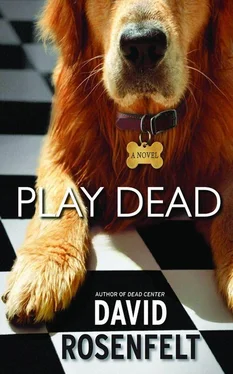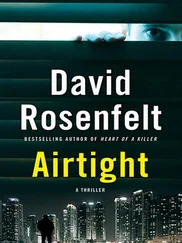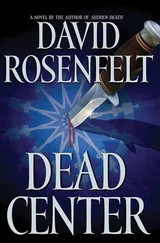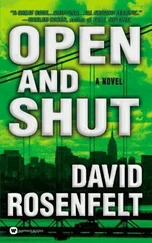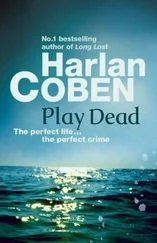David Rosenfelt - Play Dead
Здесь есть возможность читать онлайн «David Rosenfelt - Play Dead» весь текст электронной книги совершенно бесплатно (целиком полную версию без сокращений). В некоторых случаях можно слушать аудио, скачать через торрент в формате fb2 и присутствует краткое содержание. Год выпуска: 2009, Жанр: Детективная фантастика, на английском языке. Описание произведения, (предисловие) а так же отзывы посетителей доступны на портале библиотеки ЛибКат.
- Название:Play Dead
- Автор:
- Жанр:
- Год:2009
- ISBN:нет данных
- Рейтинг книги:3 / 5. Голосов: 1
-
Избранное:Добавить в избранное
- Отзывы:
-
Ваша оценка:
- 60
- 1
- 2
- 3
- 4
- 5
Play Dead: краткое содержание, описание и аннотация
Предлагаем к чтению аннотацию, описание, краткое содержание или предисловие (зависит от того, что написал сам автор книги «Play Dead»). Если вы не нашли необходимую информацию о книге — напишите в комментариях, мы постараемся отыскать её.
Play Dead — читать онлайн бесплатно полную книгу (весь текст) целиком
Ниже представлен текст книги, разбитый по страницам. Система сохранения места последней прочитанной страницы, позволяет с удобством читать онлайн бесплатно книгу «Play Dead», без необходимости каждый раз заново искать на чём Вы остановились. Поставьте закладку, и сможете в любой момент перейти на страницу, на которой закончили чтение.
Интервал:
Закладка:
Judge Gordon delays the start of the trial for one hour so that he can attend to this. I’m very pleased with his reaction; he completely understands the importance of the issue.
When the trial resumes, Hawpe’s first witness is Lou Mazzola, the night manager of the pier where Richard kept his boat. He was on duty the night that Stacy was murdered, and he testified that he saw Richard and Stacy on the boat as it was leaving.
Mazzola’s sole purpose is to place Stacy on the boat, and I have no desire to refute it, because I know it to be true, and others will say the same thing. Nevertheless, it offends my defense attorney’s sensibility to let him get away without my accomplishing anything.
“Mr. Mazzola, were Mr. Evans and Ms. Harriman alone that night?”
“They had their dog with them.” It’s a fact that Hawpe conveniently forgot to bring out on direct.
“Was that unusual?”
“No, he was with them pretty much every time.”
“What kind of dog was it?”
“A golden retriever. It’s the one I saw on television last month.”
I can’t help but smile; Mazzola has just made an important point for our side, that Reggie turned up alive recently. I can only hope that he still is.
Hawpe doesn’t want to object, because the statement has already been made, and because he doesn’t want a fight over Reggie’s identity. The court has already made a ruling about that at the hearing.
“So you’re certain the dog was with them that night?”
“Absolutely. I kept dog biscuits in my office, and I gave him one every time they were there, including that night.”
“Did you notice anything unusual about their actions that night? For example, were they unfriendly to you, or fighting amongst themselves?”
I know from the transcript of the first trial what his answer will be, and he says that he does not remember anything unusual at all.
“Could you see where the boat was docked from your office?” I ask.
“No. It was pretty far away.”
“So you weren’t watching the boat before they got there?”
“No. I had no reason to.”
“Could somebody have boarded the boat before them, and maybe hidden somewhere that they couldn’t be seen?”
Hawpe objects, but I say it’s a hypothetical, and Judge Gordon lets him answer.
“I guess so,” says Mazzola.
That’s good enough for me.
Hawpe calls two more witnesses, mainly for the purpose of placing Stacy on the boat, alone with Richard out at sea. In both cases, I’m able to demonstrate that they also saw Reggie and did not notice anything strange about Richard and Stacy’s behavior. Also, none of them were on the boat, so they would have had no opportunity to tell if someone was hiding.
I think Hawpe has made a mistake in calling these additional witnesses. Stacy’s presence that night is not in doubt, and the points I am making are damaging him, at least slightly.
After a break in the afternoon session, Judge Gordon suddenly adjourns court for the day and summons Hawpe and me into his chambers for another on the record session.
“The U.S. marshals have declined to provide any information about the woman we know as Stacy Harriman,” he says. “They cited a long-standing principle of confidentiality and cautioned that we not read anything into their position concerning whether or not Ms. Harriman was in the program. According to them, their position would be the same whether or not she was in fact under their protection.”
I’m not at all surprised to hear this. “Your Honor, we would request that you convene a hearing to consider an order to comply.”
He nods. “I already have. Ten o’clock tomorrow morning.”
* * * * *
WHENEVER SOMEBODY SAYS “U.S. marshal,” I’m thinking Wyatt Earp or Tommy Lee Jones.
I’m definitely not thinking Captain Alice Massengale, the attorney within the agency who leads a contingent of four into court for our hearing. Captain Massengale is all of five feet four and a hundred and ten pounds, one of the few lawyers I have ever gone up against whom I would be willing to arm wrestle to settle our dispute.
The physical structure of the hearing is a strange one. Kevin, Richard, and I occupy the defense table, Hawpe and his team are in their traditional place at the prosecution table, and a third table has been brought in for Captain Massengale and her group.
Hawpe is in the middle between us, and he’s uncomfortably in the legal middle here as well. When Judge Gordon petitions the U.S. Marshals Service for documents, he is doing so on behalf of the State of New Jersey. Hawpe is an employee of that state and therefore bound to advocate its position. However, as the prosecuting attorney, he is opposed to Judge Gordon’s, and my, request.
Suffice it to say, I don’t think we’ll be hearing much from Hawpe today.
Judge Gordon sets the parameters of the hearing and summarizes the situation to date. He then asks Massengale to state the position of the U.S. Marshals Service.
“Thank you, Your Honor. For over two hundred years, the United States Marshals Service has served as the instruments of civil authority for all three branches of the U.S. government. It is easily the federal government’s oldest and most versatile law enforcement agency.”
She thus launches into a fifteen-minute speech, without notes, about the glories of the Marshals Service. It’s a stirring rendition, and I’m sure I would be moved to tears if not for the fact that I doze off three or four times during it. I would object as to relevance, but I can use the snooze time.
She finally seems to be getting near the point by saying that the Marshals Service “provides for the security, health, and safety of government witnesses and their immediate dependents, whose lives are in danger as a result of their testimony against drug traffickers, terrorists, organized crime members, and other major criminals.”
It’s a false alarm, because she goes on talking about the tremendous importance of the program, the remarkable people that run it, and the extraordinary success it has had.
Finally she gets to the matter at hand. “Any breach in the secrecy of this program, no matter how small, can imperil the entire operation. It is for that reason that we must regretfully decline to comply with the court’s request.”
“Any documents you would hand over would be under seal,” says Judge Gordon.
“Even to confirm that such documents exist-and I am not saying that they do-would be to breach confidentiality by revealing whether this particular subject was in the program.”
“Mr. Carpenter?”
“Your Honor, no one is disputing the need for secrecy in this program. It is crucial that witnesses be protected. But it is considerably less crucial when the witness is already dead. For that reason, secrecy should in this case give way to the defendant’s right to a fair trial.”
Massengale comes back at me. “A precedent would be established.”
I nod. “Right. The precedent would be that dead witnesses no longer need to be protected from the revelation that they were witnesses. I think our system could survive such a precedent. And if you are able to keep your future witnesses alive, it will never come up again.”
“Our methods and procedures could be compromised,” she says. “If it is known that someone was in our system-even after they are deceased-an enterprising criminal might be able to learn how we go about protecting our people.”
It’s a good point, and I don’t have a great comeback for it, but I give it a shot. “Your method is to provide the witness with an apparently normal background. There is no way to penetrate that unless someone first identifies the person they suspect is in the program, as we did with Stacy Harriman. Additionally, everything you present will be under seal, and the court can protect your methods and procedures.”
Читать дальшеИнтервал:
Закладка:
Похожие книги на «Play Dead»
Представляем Вашему вниманию похожие книги на «Play Dead» списком для выбора. Мы отобрали схожую по названию и смыслу литературу в надежде предоставить читателям больше вариантов отыскать новые, интересные, ещё непрочитанные произведения.
Обсуждение, отзывы о книге «Play Dead» и просто собственные мнения читателей. Оставьте ваши комментарии, напишите, что Вы думаете о произведении, его смысле или главных героях. Укажите что конкретно понравилось, а что нет, и почему Вы так считаете.
